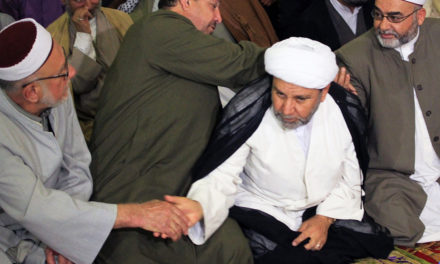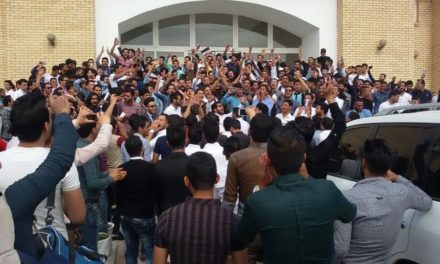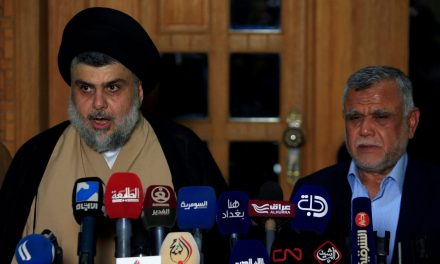Meet Yasmin Liwa Younis, the Iraqi-American COM’18 graduate and Student Speaker at Boston University’s 145th Commencement. Yasmin’s speech about reclaiming her Iraqi-Muslim identity made an impact globally and resonated with first-generation Americans, regardless of their background.
While Yasmin was visiting family in Kuwait, she felt inspired to write a speech. She wanted to share her pride in being an Iraqi-American, as well as her pride in her Iraqi name. Among hundreds of applicants, her speech made the top five finalists, and after presenting it in front of a committee, Yasmin was selected as the Student Commencement Speaker. ‘It was an amazing experience’ she described, ‘I reminded myself that this is an honour and I may never have the opportunity to share my story and the beauty of being Iraqi to an audience this big. So I took a breath, and gave it all I got, and it was exhilarating.’ Her speech was chosen by The74th as one of this year’s 7 most memorable – and inspiring – graduation speeches, amongst Oprah Winfrey, President Jimmy Carter and others.
Yasmin’s father came to the United States in 1988 for his residency at Saint Louis University. Her mother and grandmother immigrated to the U.S after leaving Kuwait and fleeing the Gulf War. Yasmin’s grandfather was the prominent Iraqi Hydrologist, Mahdi Hantush and recipient of the Meinzer Award.
Like a lot of first-generation Americans, Yasmin struggled in accepting her cultural identity, while connecting to the American one:
It’s so hard for me to put into words how challenging it was. Growing up, my life was an identity struggle. The most formidable years of my life were shaped while trying to navigate being Muslim, being Iraqi, and also being an American. I was five years old when 9/11 happened and I was seven years old when the United States invaded and destroyed my parents’ homeland: Iraq. It felt like a never-ending battle against the Western media, the kids I went to school with, and the Western world versus me, a confused, Iraqi-American Muslim just trying to live her life.
I remember how different my worlds felt when I’d go to school compared to when I went home. It felt like I had to be two completely different people, when I was just trying to figure out how I could just be me. At home I was “Yasmin,” at school and basically anywhere else I went by the anglicized “Yaz-min,” the white-washed, self-hating Iraqi-American doing everything in her might to disassociate herself from being Iraqi.
It took years of overcoming self-loathing and hatred before I realized what a blessing it is to be Iraqi, what a blessing it is to be a Muslim, and what a blessing it is to be someone like myself: a first-generation Iraqi-American Muslim woman in a time when the world needs to truly learn what it means to be Iraqi, what it means to be a Muslim, and what it means to be an Iraqi-American Muslim. I identify as Iraqi-American by doing the complete opposite of what I did growing up: speaking Arabic as much as I can, constantly talking about how beautiful Iraqi culture is, learning about the history of Iraq, and like I mentioned in my speech, reclaiming my name.
One of the greatest challenges for Iraqi children of diaspora is to have to identify with their inherited culture. They pick up the dialect, practice the traditions and learn the culture, all second-hand – passed down from their parents. Yasmin explains how she eventually reclaimed her Iraqi identity and reconciled with herself:
I reclaimed my Arab identity the same exact way I reclaimed my Iraqi identity. I began to hang out with other Arabs and Muslims by getting involved in Arabic Society, which introduced me to two people who I owe a lot of my growth to. Two of my best friends, Hind and Dina, really helped me embrace my Iraqi side. Dina always pushed me to speak Arabic with her and whenever Dina and I would go over to Hind’s apartment, it always consisted of us watching Arabic music videos, talking about our experiences (my being Iraqi-American and them being international students from Dubai and Amman) as being Arab in America.
For the first time in my life, I didn’t feel this pressure to conform. Being around Hind and Dina helped me feel comfortable with who I was which was Iraqi just as much as being an American. This peaceful feeling is what pushed me to reclaim my identity. I’ve never felt as more free as I do right now by being proud of, rather than ashamed of, who I am.
Yasmin is currently taking some time off to study for the LSAT and apply to law school. She wants to work in human and civil rights and hopes to become a practicing human rights lawyer. Yasmin thinks of travelling to Iraq and expressed that she would jump on the opportunity to visit her homeland. She dreams of experiencing what daily life is like, ‘I want to go to the coffee shops, to see the history, engage with the people, and experience what it means to be a true Iraqi’.

Zainab Mahdi
Zainab Mahdi is a marketing professional in Montreal, Canada. She is interested in the Iraqi culture, society & identity.










